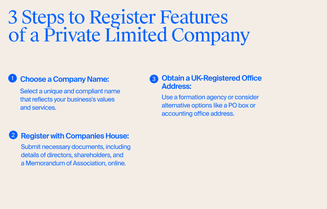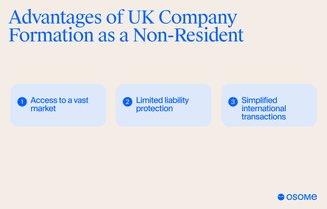A Complete Guide on Company Registration For Non-UK Residents
- Modified: 31 October 2025
- 9 min read
- Starting a Company


Heather Cameron
Author
Heather believes in the power of great storytelling and is here to craft compelling copy that informs and inspires readers. With an extensive background in digital marketing, she has experience writing for various industries, from finance to travel. As Osome’s copywriter, Heather creates content that empowers entrepreneurs and small business owners to boost their business with expert guidance, helpful accounting tips and insights into the latest fintech trends.

Yinghua Luo
Reviewer
Yin Luo is our Operations Manager based in the UK. She keeps our UK team running like a well-oiled machine and ensures our content resonates with our British audience. Before moving to operations, Yin had over 10 years of accounting experience and is an ACCA-qualified accountant. In her current role, she is our go-to expert for making complex topics easy to understand. Yin carefully reviews our UK-focused articles, ensuring they are accurate, relevant, and packed with actionable advice to help your business thrive on this side of the pond.
Yes, non-UK residents can register a company in the UK. The process is straightforward and can be completed entirely online through the online register. This article will guide you through the key steps, eligibility criteria, and necessary documents you need to know if you are considering starting your own business in the UK.
Key Takeaways
- Foreigners can easily register a UK LTD company online by completing the necessary non-UK resident form and meeting eligibility criteria, with access to company formation packages that simplify the process.
- Key steps for registration include choosing a business name, registering with Companies House, and establishing a business address in the UK.
- Forming a UK company offers numerous benefits, such as access to a larger market, limited liability protection, and potential tax incentives for non-resident entrepreneurs.
Understanding UK Company Formation for Non-UK Residents
Registering a company in the UK as a foreigner is not just a possibility; it’s a straightforward process that can be completed without visiting the UK, allowing for easy setup even if you’re based in another European country. The most critical aspect is understanding the eligibility criteria and the necessary documents required to get started. Foreigners are fully eligible to register a UK limited company, and the process is designed to be inclusive and accessible.
Owning a UK LTD company means having a legally registered company address in the UK, with access to its market and legal framework. This section delves into the specifics of who can register a company and what documents are needed, setting the stage for a successful business venture in the UK.
Ready to start your UK business? Osome offers comprehensive company registration services to guide you through the process. We'll handle the legalities and ensure your company is set up for success in the UK market.

Eligibility criteria
To register a UK limited company, non-UK residents must meet specific eligibility requirements.
First and foremost:
- Both the company director and at least one shareholder must be at least 16 years old to meet UK registration criteria.
- Non-British nationals are permitted to register a company in the UK.
- There is no requirement for the company director to be a UK resident.
This flexibility makes the UK an attractive destination for international entrepreneurs.
Additionally, a registered company address is mandatory for all foreign nationals establishing a company in the UK. This physical address will be the official location where all legal documents and correspondence will be sent. Foreigners residents should consider their visa requirements if they plan to visit the UK to operate the business, to ensure compliance with immigration laws.
Only certain business types can register as overseas companies in the UK. Partnerships and unincorporated associations are not eligible and must instead consider alternative structures, such as forming a UK limited company.
Necessary documents
To register a UK limited company, several documents are needed, including the non-UK resident form for streamlined approval and potentially address services to satisfy registration requirements.
First of all, you'll need to provide personal information such as the full legal name, date of birth, nationality, service address, and proof of ID (passport or national ID card) for all directors and shareholders. You'll also need to provide details about the proposed business name, registered office address in the UK, nature of business, identified by Standard Industrial Classification (SIC) codes, and the proposed share capital and structure.
Additionally, you may need to provide proof of your home address or company address, especially if you're appointing yourself as a director or person with significant control (PSC). Although having a UK resident director is not legally required, it can simplify processes such as opening business bank accounts, as some banks prefer at least one UK-resident director for anti-money laundering checks. Given the nuances of registration, banking, and compliance requirements, seeking professional assistance is advisable to ensure full compliance with UK regulations.
Steps to Register a UK Limited Company as a Non-UK Resident
The process of registering a UK limited company as a non-UK resident may initially seem daunting, especially for those without an offshore company background, but it is designed to be as straightforward as possible. The registration process is completed entirely online, simplifying the experience for foreigners. The main steps include choosing a business name, registering with Companies House, and setting up a physical office or home address.
These steps allow non-British residents to successfully establish their company in the UK without being physically present. The subsequent subsections will provide detailed guidance on each of these steps, ensuring a smooth and efficient registration process.

1. Choosing a company name
Choosing a company name, which will be unique and compliant, is a critical first step in the registration process, reflecting your intended business structure and brand identity. The name must be distinctive and not closely resemble that of existing competitors to avoid legal issues and confusion among customers. This not only helps establish a distinct market identity but also ensures compliance with Companies House regulations, as a legal statement signed may be required to affirm your name choice
When selecting a name, consider how it reflects your business’s values and services. A well-chosen name can significantly enhance your brand’s recognition and reputation in the marketplace. It’s advisable to conduct a thorough search on the Companies House website to ensure that your chosen name is available and compliant with the naming rules.
2. Registering with Companies House
Registering with Companies House is a crucial step in forming your business in the UK, and establishing it within the official UK company register. Non-UK residents can complete this process online, providing details of the directors, shareholders, and a Memorandum of Association. Submitting translated versions of all necessary documents into English is required to meet the UK company bank account and registration requirements, ensuring compliance with local regulations.
Once the registration is complete, you will receive official paperwork via email or post, including your certificate of incorporation and other essential documents. This paperwork confirms the legal status of your company registered and allows you to commence operations in the UK.
3. Setting up a UK-registered office address
A UK-registered office address is mandatory for any UK LTD company. This company address will be the official location for all legal documents and correspondence. Non-British residents can obtain this address through various government agencies, which often provide prestigious addresses in cities like London. Securing a prestigious London address for your registered business address can enhance credibility among UK customers and partners.
Alternative options for a physical address include using a PO box or an accounting office address, depending on your needs and budget. The key is to have a genuine physical address in the UK to meet the legal requirements and ensure smooth communication with UK authorities.
Opening a Business Bank Account in the UK
Opening a business bank account in the UK is highly recommended for separating your personal and business finances. It enhances your company’s credibility with customers and suppliers, making it easier to conduct business transactions. Non-UK residents can open a UK bank account without needing to visit the country, thanks to virtual office addresses and banks offering international services.
Company formation agencies can assist with the process, ensuring a smoother banking experience for non-residents. They can guide you through the stringent checks imposed by UK high-street banks, which can be complex for non-residents. Although UK companies are not legally required to hold a UK bank account, having one is highly beneficial for managing your business operations and properly submitting your non-UK resident form.
Setting up a UK bank account can be helpful for managing a UK-based LTD company remotely. However, having a UK bank account simplifies financial management and enhances your company’s standing in the UK.
While a UK business bank account boosts credibility and financial clarity, non-residents may face stricter checks with high-street banks. Fintech options like Wise or Revolut — or SME-friendly choices like Metro Bank — often offer a faster, more flexible route.

Accounting Manager
Benefits of Forming a UK Limited Company as a Non-UK Resident
There are numerous benefits to forming a limited company as a foreigner:
- Access to a large and diverse market. A UK-registered company can significantly boost business growth potential and open doors to global trade opportunities.
- Enhanced investor confidence. The UK’s strong international reputation makes it easier to attract investors and business partners.
- Limited liability protection. Company owners’ personal assets are safeguarded, as liability is limited to their investment in the company.
- Credibility and legal stability. Operating under the UK’s transparent and reliable legal system adds credibility and trustworthiness.
- Tax advantages. Non-residents may qualify for specific tax exemptions or incentives depending on business structure and operations.
- Simplified banking and transactions. A UK company registration facilitates easier access to international banking services and smoother cross-border transactions.
- Strategic European presence. Establishing a UK entity provides a solid base for business expansion across Europe and beyond.

Tax Obligations and Compliance
Tax obligations are a crucial aspect of operating a UK limited company. Companies are liable for corporation tax and, if they employ someone in the UK, must also register for PAYE and National Insurance with HMRC. Understanding these responsibilities is essential to ensure compliance and avoid penalties.
Companies that receive UK property income are obligated to pay Corporation Tax instead of Income Tax as of April 6, 2020. If the company’s only UK income is from property, they may not need to make payments for future tax years after 2020. Accurate accounting records must be maintained for a minimum of six years, tracking all financial transactions, income, expenditures, assets, and debts.
Filing Company Tax Returns requires submitting accounts and tax computations in iXBRL format. Services are available to facilitate compliance with PAYE and VAT registration requirements, aiding non-residents in adhering to UK regulations.

Maintaining Your UK Limited Company
Maintaining your UK limited company involves adhering to several ongoing compliance requirements. Annual returns must be filed with Companies House, providing updated information about your company, including financial details and director information. Proper record maintenance is essential, and records must be kept for at least six years to comply with UK law.
Failing to maintain an up-to-date company register or meet compliance obligations can lead to penalties or even dissolution. Therefore, it is critical to understand and fulfil all legal obligations to ensure the smooth operation and legality of your business.
How Osome Helps with UK Company Formation
Setting up a UK company as a non-resident can be complex, but Osome streamlines the entire process. Services include preparing and submitting incorporation documents, providing a company secretary, and offering a registered UK address. Expert guidance ensures the right business structure is chosen, helping founders make informed decisions from the start.
Osome’s fully digital platform allows entrepreneurs to manage company details online, track filings, and stay compliant with HMRC and Companies House. Non-residents can also receive support in opening a UK business bank account, simplifying international transactions and daily operations. With Osome, company registration becomes faster, smoother, and more reliable, allowing founders to focus on growing their business.
Summary
Registering a UK company as a non-resident offers access to a credible business environment, limited liability protection, and simplified international operations. Choosing the right structure, whether a Limited Liability Company (Ltd) or Limited Liability Partnership (LLP), impacts taxation, reporting, and operational flexibility. Professional support, such as Osome’s incorporation services, makes registration and ongoing compliance straightforward, allowing founders to focus on growth while staying fully compliant with UK regulations.






